Related Research Articles

The Red Badge of Courage is a war novel by American author Stephen Crane (1871–1900). Taking place during the American Civil War, the story is about a young private of the Union Army, Henry Fleming, who flees from the field of battle. Overcome with shame, he longs for a wound, a "red badge of courage", to counteract his cowardice. When his regiment once again faces the enemy, Henry acts as flag-bearer, carrying the regimental colors.
This article contains information about the literary events and publications of 1867.
This article contains information about the literary events and publications of 1866.
Naturalism is a literary movement beginning in the late nineteenth century, similar to literary realism in its rejection of Romanticism, but distinct in its embrace of determinism, detachment, scientific objectivism, and social commentary. Literary naturalism emphasizes observation and the scientific method in the fictional portrayal of reality. Naturalism includes detachment, in which the author maintains an impersonal tone and disinterested point of view; determinism, which is defined as the opposite of free will, in which a character's fate has been decided, even predetermined, by impersonal forces of nature beyond human control; and a sense that the universe itself is indifferent to human life. The novel would be an experiment where the author could discover and analyze the forces, or scientific laws, that influenced behavior, and these included emotion, heredity, and environment. The movement largely traces to the theories of French author Émile Zola.

William Bowen Campbell was an American politician and soldier. He served as the 14th governor of Tennessee from 1851 to 1853, and was the state's last Whig governor. He also served four terms in the United States House of Representatives, from 1837 to 1843, and from 1866 to 1867.
In American history, the Fire-Eaters were a group of pro-slavery Democrats in the Antebellum South who urged the separation of Southern states into a new nation, which became the Confederate States of America. The dean of the group was Robert Rhett of South Carolina. Some sought to revive America's participation in the Atlantic slave trade, which had been illegal since 1808.

John Brown Baldwin was a Virginia lawyer and Democratic politician, who served one term in Virginia House of Delegates before the Virginia Secession Convention of 1861, during which he was a Unionist. During the American Civil War, Baldwin believed his primary loyalty was to his state, and served as one of Virginia's representatives to the First and Second Confederate Congresses. He became one of the leading critics of President Jefferson Davis, who was seen by many as usurping the Confederacy's states' rights principles. During Congressional Reconstruction, Baldwin became Speaker of the Virginia House of Delegates.
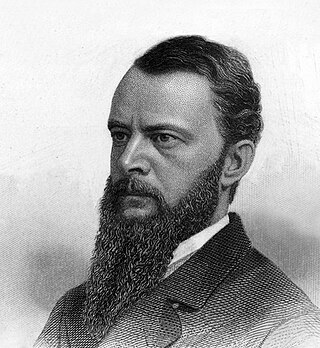
Edward Alfred Pollard was an American author, journalist, and Confederate sympathizer during the American Civil War who wrote several books on the causes and events of the war, notably The Lost Cause: A New Southern History of the War of the Confederates (1866) and The Lost Cause Regained (1868), wherein Pollard originated the long-standing pseudo-historical ideology of the Lost Cause of the Confederacy.
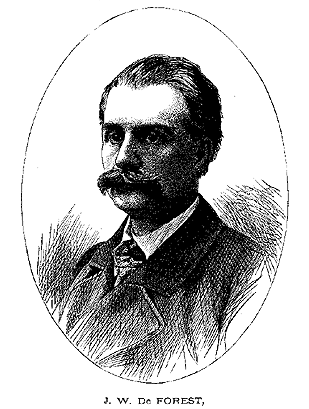
John William De Forest was an American soldier and writer of literary realism, best known for his Civil War novel Miss Ravenel's Conversion from Secession to Loyalty. He also coined the term for the Great American Novel, one which would embody the country in one text.
"Great Scott!" is an interjection of surprise, amazement, or dismay. It is a distinctive but inoffensive exclamation, popular in the second half of the 19th century and the early 20th century, and now considered dated.
The Ironclad Oath was an oath promoted by Radical Republicans that required federal employees, lawyers, and federal elected officials to swear upon entry of office that they had never supported the Confederacy. The first such law adopted by Congress was in 1862 which attempted to make the oath a requirement for the incoming members of the 38th United States Congress to take the oath. In 1863, President Abraham Lincoln proposed the Ten percent plan, which proposed that a state in rebellion could be reintegrated if a similar oath, with an additional pledge to abide by the nationwide abolition of slavery, was taken by 10% of its voters. Congress then attempted to raise this to 51% of voters in the Wade–Davis Bill of 1864, which Lincoln pocket vetoed on the grounds that is was too harsh. After the assassination of Lincoln in 1865, his successor, Andrew Johnson, opposed the oath altogether. Given the temporary disenfranchisement of the numerous Confederate veterans and local civic leaders, a new Republican biracial coalition came to power in the eleven Southern states during Reconstruction. Southern conservative Democrats were angered to have been disenfranchised.

Alabama was central to the Civil War, with the secession convention at Montgomery, birthplace of the Confederacy, inviting other states to form a Southern Republic, during January–March 1861, and develop constitutions to legally run their own affairs. The 1861 Alabama Constitution granted citizenship to current U.S. residents, but prohibited import duties (tariffs) on foreign goods, limited a standing military, and as a final issue, opposed emancipation by any nation, but urged protection of African slaves, with trial by jury, and reserved the power to regulate or prohibit the African slave trade. The secession convention invited all slaveholding states to secede, but only 7 Cotton States of the Lower South formed the Confederacy with Alabama, while the majority of slave states were in the Union. Congress voted to protect the institution of slavery by passing the Corwin Amendment on March 4, 1861, but it was never ratified.

During the American Civil War, North Carolina joined the Confederacy with some reluctance, mainly due to the presence of Unionist sentiment within the state. A popular vote in February, 1861 on the issue of secession was narrowly won by the unionists. This slight lean in favor of staying in the Union would shift towards the Confederacy in response to Abraham Lincoln's April 15 proclamation that requested 75,000 troops from all Union states, leading to North Carolina's secession. Similar to Arkansas, Tennessee, and Virginia, North Carolina wished to remain uninvolved in the likely war but felt forced to pick a side by the proclamation. Throughout the war, North Carolina remained a divided state. The population within the Appalachian Mountains in the western part of the state contained large pockets of Unionism. Even so, North Carolina would help contribute a significant amount of troops to the Confederacy, and channel many vital supplies through the major port of Wilmington, in defiance of the Union blockade.
Literary realism is a literary genre, part of the broader realism in arts, that attempts to represent subject-matter truthfully, avoiding speculative fiction and supernatural elements. It originated with the realist art movement that began with mid-nineteenth-century French literature (Stendhal) and Russian literature. Literary realism attempts to represent familiar things as they are. Realist authors chose to depict every day and banal activities and experiences.
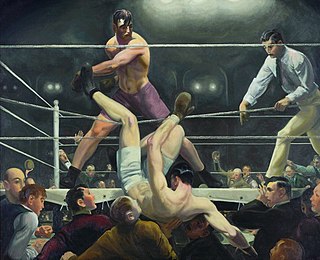
American Realism was a style in art, music and literature that depicted contemporary social realities and the lives and everyday activities of ordinary people. The movement began in literature in the mid-19th century, and became an important tendency in visual art in the early 20th century. Whether a cultural portrayal or a scenic view of downtown New York City, American realist works attempted to define what was real.

The Adventures of Mao on the Long March is Frederic Tuten's first published novel. The novel is a fictionalized account of Chairman Mao's rise to power, and is highly experimental in nature, including extensive use of parody and collage.
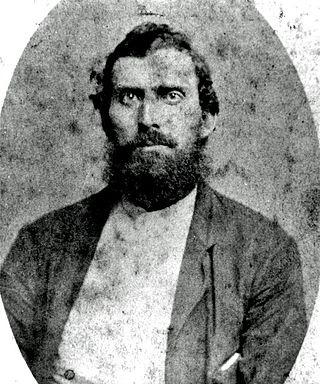
In the United States, Southern Unionists were white Southerners living in the Confederate States of America opposed to secession. Many fought for the Union during the Civil War. These people are also referred to as Southern Loyalists, Union Loyalists, or Lincoln's Loyalists. Pro-Confederates in the South derided them as "Tories". During Reconstruction, these terms were replaced by "scalawag", which covered all Southern whites who supported the Republican Party.
Anne Moncure Crane (Seemüller) was an American novelist, who wrote books such as Emily Chester,Opportunity and Reginald Archer., which were about female sexual desires. Her novels were considered controversial in some quarters of post-Civil War American society. The author Henry James was influenced by Crane's books. She was an important writer in early American realism.

George Taliaferro Ward was a major cotton planter and politician from Leon County, Florida. He served in the Confederate Army as a colonel during the American Civil War, dying near Williamsburg, Virginia.
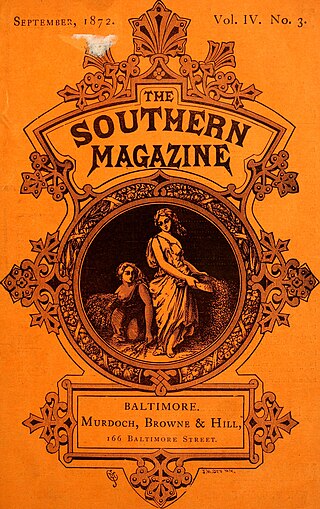
The Land We Love was an American little magazine. It was founded in May 1866 by Daniel Harvey Hill, a former Confederate general, who edited it until March 1869. The eponymous land was the Southland, and the magazine recounted the South's story of the American Civil War, communicating "a hatred of the North", according to Frank Luther Mott. Hill wrote much of the material; other contributors included Richard Malcolm Johnston, John Reuben Thompson, Francis Orray Ticknor, Paul Hamilton Hayne, and Margaret Junkin Preston. It published fiction, poems, agricultural reports, war stories, travel stories, and camp humor. It claimed 12,000 subscribers in April 1867, but that same year complained of subscribers who didn't pay because, it claimed, of the South's poverty. Hill's publication partners were James P. Irwin and J. G. Morrison.
References
- 1 2 Kellison, Kimberly R. "John William De Forest" in Encyclopedia of the Reconstruction Era, Zuczek, Richard (editor). Westport, CT: Greenwood Press, 2006: Vol. I, p. 191. ISBN 0-313-33075-1